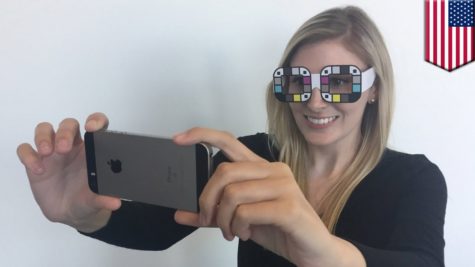Biliscreen App Made to Detect Pancreatic Cancer
October 2, 2017
 By the end of October, Biliscreen will be released in the app store for both Android and Apple devices. Made by researchers at the University of Washington, Biliscreen is an app with the ability to detect pancreatic cancer.
By the end of October, Biliscreen will be released in the app store for both Android and Apple devices. Made by researchers at the University of Washington, Biliscreen is an app with the ability to detect pancreatic cancer.
So what is pancreatic cancer? Pancreatic cancer is a “cancer that begins in the organ lying behind the lower part of the stomach (pancreas).” Symptoms that come after getting this type of cancer include loss of appetite and weight loss. Scientist don’t know the exact identifiers that cause you to be diagnosed with pancreatic cancer but they know risks that lead to being diagnosed. Tobacco use, heavy exposure to certain chemicals, the increase of age, gender, and race are only a few of the risk towards pancreatic cancer. Some of the ways to prevent from being diagnosed are to stay away from tobacco use, limit alcohol use, and staying at a healthy weight.
Pancreatic cancer is not easy to detect early. Because the pancreas is deep inside the body, health care providers are not able to see what is going on while performing their routine for physical exams. That’s where Biliscreen comes in. Biliscreen will be able to detect pancreatic cancer at an early stage before you start to show symptoms.
First, you will need to download the app, Biliscreen. After opening the app, you will be able to scan your eyes using the camera from your device. This is all that is needed for Biliscreen to diagnose you. The app will be looking at the whites of your eyes, sclera. It will be on the lookout for yellowness behind your eyes that you might not notice.
We asked two people for their opinions on Biliscreen. When asking Mr. Allen, a teacher here at RHHS, what his thoughts were on the new app, his reply stuck with us. Along with predicting that it would scare people, Mr. Allen also didn’t see the point in having the app. Next up, Nathaly P. was next in giving us a reply on this upcoming app. Nathaly’s focus was towards the different devices used for Biliscreen. “…people have different types of phones with different quality cameras so some pictures people send may look yellow when it’s really not.” She doesn’t see herself giving the app a try after it’s release.
Whether you think the app will be successful or not, it might help to give it a try. So during the month of October, be ready for an app that could possibly change the medical industry towards pancreatic cancer.





